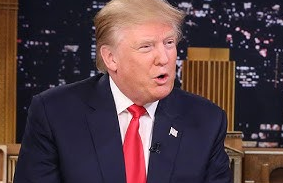The political landscape in the United States is shifting dramatically following the election of Donald Trump as president-elect, creating shockwaves that are reverberating through various sectors, particularly the Democratic Party and Hollywood. Late-night television, a platform once perceived as a cultural juggernaut, is now among the many casualties of Trump's re-emergence in politics. The hosts of shows like Stephen Colbert, Jimmy Kimmel, and Jimmy Fallon are grappling with declining viewership and a noticeable loss in cultural significance.
A study by the Media Research Center highlights the late-night comedians' approach leading up to the 2024 election, revealing an overwhelming focus on Trump as the target of their humor. During the period from September 3 to October 25, an astonishing 98 percent of the 1,463 jokes told about Trump and his running mate Kamala Harris were directed solely at Trump. In stark contrast, JD Vance, the vice-presidential candidate, registered as the punchline for only 78 percent of the jokes aimed at the candidates' running mates.
This unrelenting focus on Trump has not resonated well with viewers, evidenced by the sharply declining ratings. Many critics argue that the phenomenon known as “Trump Derangement Syndrome” illustrates a disconnect between late-night programming’s anti-Trump sentiment and the interests of everyday Americans. As a result, viewers have increasingly turned away from these once-beloved shows, resulting in a crisis of relevance and diminished sway in the late-night landscape.
As the Democratic Party grapples with its uncertain future, marked by a lack of leadership and suitable candidates, the challenges faced by Hollywood figures have also become evident. The irony lies in the unfulfilled promises by celebrities like Alec Baldwin and Cher, who vowed to emigrate to Canada should Trump secure election victories, further encapsulating the disarray within both political and entertainment spheres.
The stagnation in late-night comedy reflects a broader cultural transformation amidst Trump’s political resurgence. To stay afloat in an increasingly polarized media environment, late-night shows may need to shift gears and adopt narratives that resonate more profoundly with their audiences, lest they continue to fall victim to the changing tides of public sentiment.





















